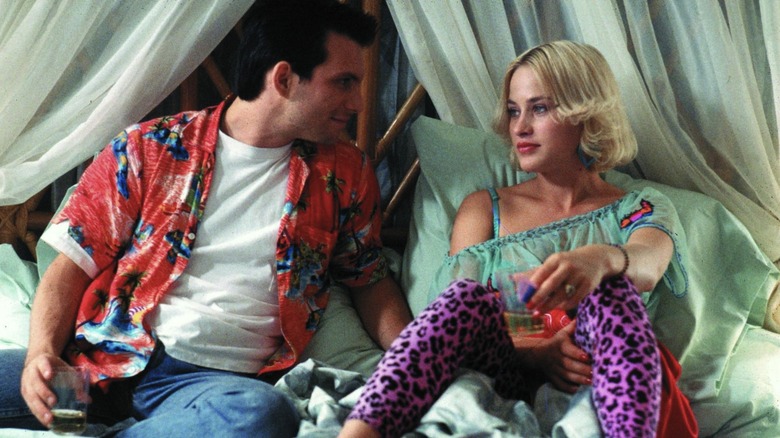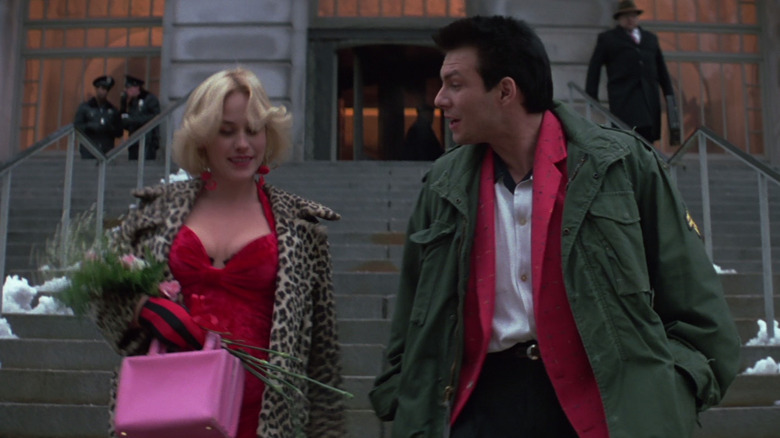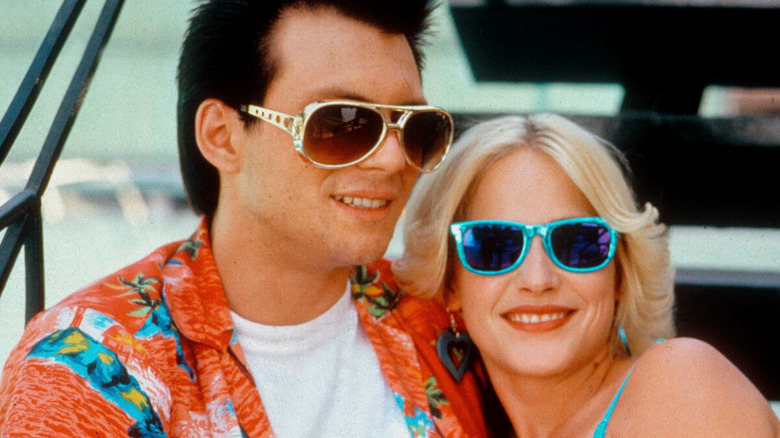Quentin Tarantino's Original True Romance Script Was A Lot More Scrambled
The screenplay for "True Romance" might be Quentin Tarantino's greatest masterpiece, and it's also one of the only films he wrote that he did not direct himself. That said, director Tony Scott made quite a few changes to Tarantino's original work, transforming an experimental story into a much more traditional narrative. In fact, the first rendition of the script was totally non-linear. Did these changes work for the better, or were we robbed of ground-breaking cinema?
Tarantino famously subverts a linear three-act structure in his films. "Pulp Fiction," for example, tells several interweaving narratives out of order. His directorial debut "Reservoir Dogs" also tells its story out of linear sequence. In both of these films, the audience doesn't truly understand the stakes of the first scene until the second or third act. Following the trend, "True Romance" was initially written with this same unconventional structure in mind,
"True Romance wasn't written in a linear fashion originally," the writer told Film Comment. "It started off with the same first scene of Clarence talking about Elvis, then the next scene was Drexel killing all his cronies and the third scene was Clarence and Alabama at Clarence's father's house. And then you learn how he got what he got."
The choice to transform the narrative into a more straightforward story was not Tarantino's idea but he didn't take issue with the changes. "Tony [Scott] made it all linear," Tarantino explained, "and it worked that way."
Tarantino prefers a non-linear narrative
As Quentin Tarantino explained during his interview with Film Comment, the original structure for "True Romance" was a lot closer to that of "Reservoir Dogs." Here's what he had to say:
"If you break it into three acts, the structure they all worked under was: in the first act the audience really doesn't understand what's going on, they're just getting to know the characters. The characters have far more information than the audience has. By the second act you start catching up and get even with the characters and then in the third act you now know far more than the characters know, you're way ahead of the characters. That was the structure 'True Romance' was based on and you can totally apply that to 'Reservoir Dogs.'"
In Tarantino's rendition of "True Romance," the audience would always be a step ahead or a step behind the main characters. Clarence and Alabama always try to stay a step ahead of their enemies but end up a step behind. It would have added an interesting layer to the viewing experience if the audience, too, was caught in this game of cat-and-mouse.
Tony Scott's more direct narrative approach may have made the film more accessible, though. He had a Hollywood sensibility, through and through, — he directed "Top Gun," for Pete's sake. Scott was much more romantic than Tarantino, so he opted to tell a more romantic version of the story with a much more romantic ending. But were Scott's choices purely commercial, or did his sentimentality pay off?
Tony Scott was more conventional
The final cut of "True Romance" was a pretty far cry from Quentin Tarantino's vision when he wrote the screenplay. The version that hit theaters might have been less avant-garde than what the auteur had in mind, but it was also a lot more romantic.
"[M]ine would have been more cynical," Tarantino told Indiewire. "I wanted to make you fall in love with Clarence and blow his f***ing head off, I wanted to do that to you. Tony didn't want to do that. Clarence was me, I could blow my own head off, a punk rock move." Scott's version of "True Romance" was sweeter because he loved the characters just as much as the audience did. He let them float in a cloud of ignorant bliss right to the very end. Scott kept "True Romance" true to the romance of its name. In the end, the more artistic choice was to include a more conventional ending.
"Let's just fall in love with them and stay there," Tarantino recalled the late director telling him. I'm not doing it to be a commercial f***. I'm doing it because I love these f***ing kids, they f***ing deserve it. I can't f***ing kill them." In the end, it was not Scott who penned these changes himself, but "The Rules of Attraction" director Roger Avary. Still, it's safe to say that Scott made the final call.
"True Romance" is refreshing because nothing bad happens. It's a total fantasy written into a gritty crime movie. In a post-Tarantino world, this sentimental quality is exactly what makes "True Romance" stand out.


